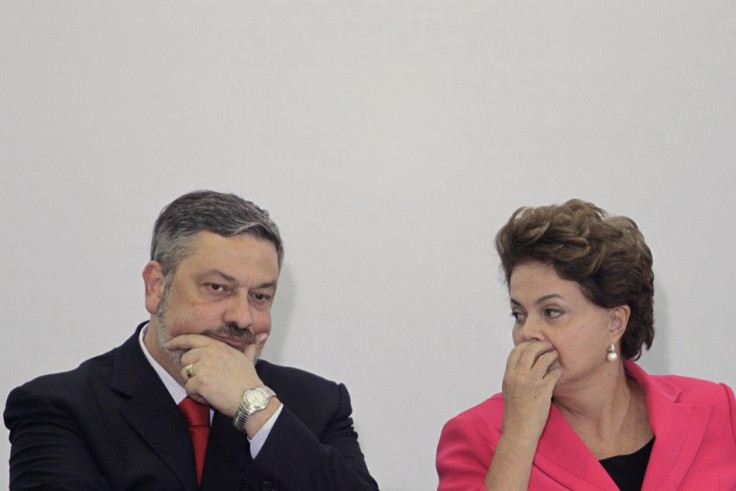Brazil president's aide Polocci resigns after scandal

The most powerful pro-business voice in Brazil's government resigned on Tuesday following a scandal over his sudden riches, prompting worries on Wall Street that his departure could herald a leftward drift in economic policy.
Often described by followers as the 'most influential' member of President Dilma Rousseff's government, Chief of staff Antonio Palocci said he was quitting to prevent the scandal from further weakening Rousseff's young administration of five months.
Palocci's departure deprives Rousseff of an ambassador to Wall Street who had acquired an almost mythical reputation for his defense of responsible fiscal and monetary policies in a party with strong roots in trade unionism.
Palocci's work as finance minister in a previous government helped lay the groundwork for Brazil's current economic boom.
Palocci, a medical doctor by profession, had quit as finance minister in 2006 because of an ethics scandal, faced a demand from Brazil's federal public prosecutor to provide further details on contracts with clients of the consulting firm that he ran while serving in Congress.
Palocci had changed the consulting firm's mission to real estate management two days before he took office as Rousseff's chief of staff.
His departure is unlikely to result in any immediate policy shifts, as Rousseff and other senior officials have repeatedly stressed their commitment to keep inflation low and budget spending under control. The pillars of Brazil's prosperity have remained largely unchanged for a decade.
Yet Palocci's absence could weaken Rousseff's determination to push market-friendly policy changes like simplifying the tax code.
It could also strengthen other officials in government and the ruling Workers' Party who want greater state intervention in key industries such as oil.
This doesn't look good. Palocci was really the voice of reason in the government, said John Welch, chief emerging markets strategist at Macquarie Capital in New York. Palocci was for fiscal responsibility and clearly some people in the (Workers' Party) wanted him out, according to the report.
Palocci's replacement as chief of staff will be a little-known, 45-year-old senator, Gleisi Hoffman, who is also the wife of the communications minister.
The switch leaves Rousseff, a career bureaucrat with no previous experience in elected office, with aides who are good in administration and economy but perilously short on the political skills that are critical to maintaining power and getting legislation through Brazil's Congress.
The crisis could also mean greater role or return of Rousseff's predecessor and political mentor, Luiz Inacio Lula da Silva, whose charisma and economic success during his 8 years in power overshadowed almost every aspect of Brazilian politics.
I think President Rousseff will easily overcome his departure and substitute his absence with either a new aide or with the strengthening of her own leadership. No one is indispensable, said Alfredo Coutino, director for Latin America of Moody's Analytics.
Markets reacted negatively to Palocci's resignation with prices for Brazil's sovereign bonds falling slightly. However, some investors said the sell-off was likely to be limited due to the country's entrenched economic stability.
Palocci's departure was expected. Political noise is always bad for markets, but I am sure that the effect on asset prices won't be too big, said Carlos de la Rocque, a fixed income and derivatives trader at Brasif Gestao.
Palocci denied wrongdoing in the statement announcing his resignation on Tuesday, saying his decision to step aside was purely political.
The lasting impact of the crisis may depend on whether Rousseff and other officials can develop the political skills needed to push reforms through Congress, said the report.
© Copyright IBTimes 2024. All rights reserved.





















